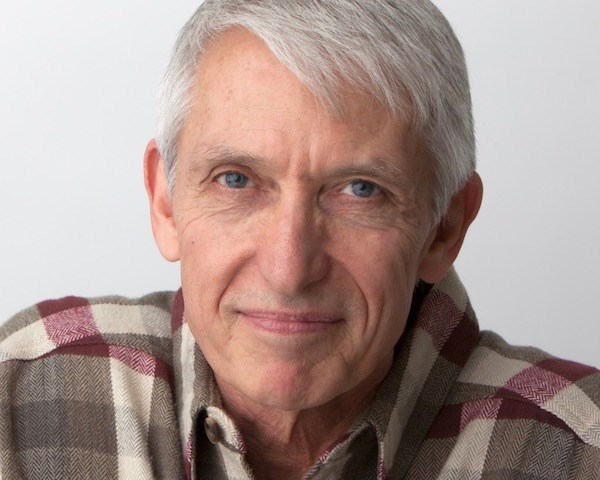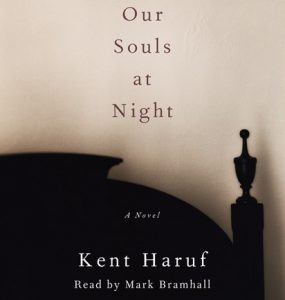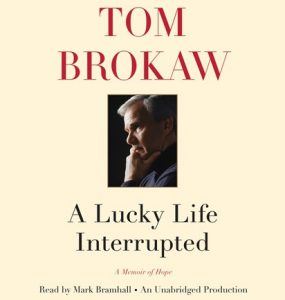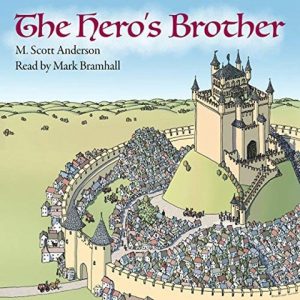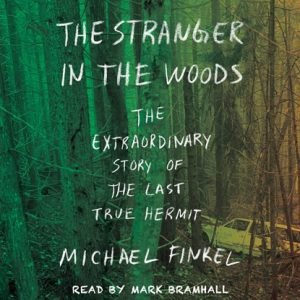 Today’s guest here at Take 5 created a problem for me, though it wasn’t anything the delightful Mark Bramhall did. The fault lies with the fact that I was forced to restrict my overview of his incredible range of work as an audiobook narrator to only five titles. What’s a fan to do? (Hint: I cheated a little!)
Today’s guest here at Take 5 created a problem for me, though it wasn’t anything the delightful Mark Bramhall did. The fault lies with the fact that I was forced to restrict my overview of his incredible range of work as an audiobook narrator to only five titles. What’s a fan to do? (Hint: I cheated a little!)
Mark’s rich voice and thoughtful characterizations have accompanied me through some of my favorite fiction (like EVERYBODY’S FOOL) and have increased my enjoyment of history and biography (don’t miss GRANT). His performances of thrillers keep me on the edge of my seat, and when it comes to connecting me emotionally to a novel . . . well, let’s just say I keep the tissues handy. (See how I worked additional audiobooks into this post?!)
Whatever your preferred listening genre (fantasy to politics) or target audience (children to adult), you’ll have your choice of recommended Mark Bramhall-narrated audiobooks. Here are five to get you started.
5 Audiobooks
My first recommendation is one of my personal favorite audiobooks: Kent Haruf’s OUR SOULS AT NIGHT. This beautiful story focuses on two people hoping to age with dignity in their own homes, while finding late-in-life comfort and friendship in each other. Leaving sentimentality behind, Mark highlights the characters’ complex feelings as they balance their personal desires with their obligations to their adult children. Warning: You might want to listen to this more than once.
If you watch television, then you’re likely familiar with commentator and host Tom Brokaw, who appeared first on The Today Show and then as the anchor for NBC’s Nightly News. Just as Brokaw was looking forward to his active retirement, he was diagnosed with treatable but incurable cancer. In A LUCKY LIFE INTERRUPTED he muses on mortality and healthcare as well as highlights of his legendary career. Mark’s delivery matches the varying tones of Brokaw’s upbeat stories of family and work, sobering reactions to his diagnosis, and ultimate feelings of hope and gratefulness.
Are you a fantasy and adventure fan? If so, put THE HERO’S BROTHER by M. Scott Anderson in your listening queue. This young adult novel is set in a medieval world and introduces us to the youngest and (so far) least impressive of seven brothers. When Frith is given the chance to prove himself, he sets out on a quest in the company of a motley crew—heart-thumping action mixed with good humor ensue. Mark’s work on this audiobook is impressive, as he gives voice to dozens of characters, each with a distinctive sound and accent. He also gets to highlight his spot-on comedic timing.
THE STRANGER IN THE WOODS, by investigative journalist Michael Finkel, introduces us to a true-life modern-day recluse. In the 1980s, Christopher Knight purposely disappeared into the Maine woods, intent on a self-sufficient, isolated existence. Seldom seen, he would sometimes break in to cabins, taking what he considered only necessary supplies and reading material; after one such burglary in 2015, he was arrested, and thus began his reentry into society. Mark’s performance is expressive and compelling, but he wisely avoids a judgmental attitude, allowing listeners to decide for themselves whether Knight is to be admired or condemned.
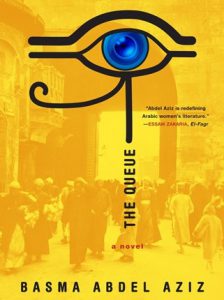 Basma Abdel Aziz’s THE QUEUE caught my attention, not only because Mark is the narrator but also because I think this novel speaks to contemporary Western issues though set in an alternative history Egypt. Citizens of all walks of life and socioeconomic status must wait in line in front of city gates that never open to obtain authorization for everyday activities, including receiving medical care. Reviewers have noted that Mark distinguishes among the diverse characters, emphasizing their freefalling emotions, as initial hope morphs slowly into desperation while the authorities continue to look the other way.
Basma Abdel Aziz’s THE QUEUE caught my attention, not only because Mark is the narrator but also because I think this novel speaks to contemporary Western issues though set in an alternative history Egypt. Citizens of all walks of life and socioeconomic status must wait in line in front of city gates that never open to obtain authorization for everyday activities, including receiving medical care. Reviewers have noted that Mark distinguishes among the diverse characters, emphasizing their freefalling emotions, as initial hope morphs slowly into desperation while the authorities continue to look the other way.
5 Questions
Have you finished adding audiobooks to your wish list? Before you decide which title you’re going to listen to first, take a few minutes and meet Mark Bramhall, who kindly agreed to answer a 5 questions about being an audiobook narrator and life outside the recording booth.
AudioFile Magazine: What are you doing when you’re not working?
Mark Bramhall: Until very recently, I would have unhesitatingly replied, “acting”; and, if you asked me to be specific about where and what, said, “mostly on stage, but anywhere—stage or screen, large or small.” Currently, I would add, “writing—specifically, poetry and/or plays.”
But my “first” art—beginning in grade school, and continuing into college years—was writing, and the urge to revisit it (or guilt at not doing so) has persisted and, lately, come to the fore. I spent a couple of months last fall writing a play—only the third I’ve attempted in my life, but the first that I’ve vowed to take to completion: i.e., production, or bust.
I also love being outdoors, hiking, riding (haven’t for years, but did a lot when I was younger), camping (ditto), hunting (I disarmed, decades back, but tramping around the wilderness in hunter mode was the real point, not the killing of wildlife), and whatever else provides an excuse to be in Gaia’s good company. Picture-taking is a meditation. So is cooking with whatever’s at hand.
I love being a Grampa, too—especially, reading little and sometimes not-so-little ones to sleep at bedtime or nap time. My mother taught me love of language that way. She would read books like MOBY-DICK to me when I was very small.
AFM: What’s your first reaction when someone asks you how he or she could become an audiobook narrator?
MB: Immediately after I quash the killer instinct which seeks to eliminate all competition for the work—this takes about 5 milliseconds—I recall that I got my own start in precisely this way, and that everybody not in the 1% is looking for work doing something they actually love, and that karma actually is a Thing, and that, with close to 400 books out there, I probably have a secure enough spot in the narrating labor pool to last till I’m under the sod. Whereupon, I make whoever it is very happy by offering to give them some contacts to try, and some advice if they want it, and my serious wishes for success. Which has occasionally helped to launch a career or two, not to mention created or deepened a friendship. (Remind me to tell you the Irish gag about unemployment . . . )
AFM: What are some of the particular challenges of narrating nonfiction?
MB: Such a great question! The past year seems to have been loaded with nonfiction for me—probably because I won an Audie last year for a lovely nonfiction book (AMERICAN WOLF), and so have been temporarily (I hope) pigeonholed in the genre. I’ve whined about that occasionally, because the audience tends to be smaller, the publicity slightly muted, and critical response less gushy: the red-headed stepchild of book categories. However, I don’t object to being a go-to guy for anything at all, despite my preference for fiction, a category in which I’ve also been pigeonholed, and, hopefully, still am. Why do I like it better? Because it’s more like being in a play! Voice acting is called for, much more than in nonfiction.
It’s hard to keep in mind that nonfiction is still storytelling: easy—in the case of bizarre true stories, not far removed from fiction (STRANGER IN THE WOODS, for example)—but difficult in more academic works, overflowing with dates and citations and quotations and footnotes, present not just for form’s sake, but because this particular writer just geeks out on the story. The stretch is to realize that if the author were in front of you, actually telling it the way s/he hears it in her or his own head, you might giggle for joy and hang on every word. I won’t pretend that I can keep this notion front and center when I’m in a 50-hour marathon like Ron Chernow’s GRANT; but I do try. (Chernow’s bottomless knowledge and detail certainly helps. I also permit myself some subtle acting in these narrations—where I think it will pass—adding a whiff of personality to historical personages, etc.)
The hardest nonfiction I’ve done to date was a few months back: the New York Time’s extremely erudite music critic has written a compendium of personal favorites through the ages, explicating the aesthetics of selected masterpieces in enormous detail—but without use of the scores and, of course, without recourse to any actual musical sounds—instead, depending entirely on verbal descriptions of those sounds to make the case for each. Even using the same geek-identification technique described above, this one was a trial—and, I believe, useful mainly for exhaustive listings of specific recordings in the appendix.
AFM: What’s your most embarrassing moment in the recording booth?
MB: I’m very good with accents and often get critical praise for virtuosity. However, authentic Australian is a challenge for me. Only recently have I been helped by an Aussie friend and come a bit closer to acceptability. The reason I’ve worked on it was a listener response to my brief rendering of the accent in a much-praised fantasy series which shall go unnamed. . . . I opened the email from my website, blithely expecting another rave, and instead got this:
“I’m an Australian and you pretty much ruined the entire audio book with that horrible impersonation Jesus f****** Christ do some basic research. Not only was the accent completely demented but you even said words wrong phonetically . . .”
In shock, and utterly mortified, I wrote back: “You might know that actors have a saying about reviews: either ignore them entirely, or weigh the bad ones equally with the good. Please know that your horrible experience with [the character’s] accent is taken to heart. Back to research and rehearsal with this one, and no more Australian characters for me until I can pass muster with listeners such as yourself.
“I’m not a masochist, so please don’t misunderstand when I say thank you for your message. Abundant good reviews are fun to receive, of course, but the occasional bad one can sometimes be more valuable. And a truly painful one is only returning the pain that the performance caused. So: we’re even.
“I hope the bad experience won’t put you off audiobooks completely—and that perhaps my own work will earn your respect another day.”
I assumed I’d never hear from him again, barring an assassination attempt; but he then popped back:
“Hey—I loved the first book and I have no other criticisms other than [this one]. Keep up the good work just remember that we’re not all Steve Irwin lol.”
AFM: What are the pros and cons of working on a multi-narrator audiobook?
MB: One often finds oneself in august artistic company—rarefied air, so to speak (a pro)—though not necessarily working in the same room, or even the same region (a con). The gigs are sometimes quite brief, so the minimum-pay rule works to advantage. Someone familiar with the project—and the other voices—on the other side of the glass is really a necessity; otherwise (absent careful read of the entire book) it can be easy to miss a recurrent theme or a plot point or a character trait that would enhance the book as a whole.
Thanks so much, Mark, for letting us get to know you better. I’m still laughing over the Steve Irwin comment. Now that it’s officially spring, I hope you find the time to get outside and enjoy nature, perhaps with a camera or grandkid in tow.
For even more audiobooks read by Mark Bramhall, be sure to check out his impressive audiography.


